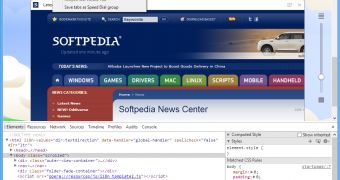While there aren't many new features in the new Opera, apart from the Off-Road mode and everything inherited from Chrome, there are plenty of missing characteristics, including some basic functionality.
Just at a first glance the missing features are obvious. Not only are there missing characteristics compared to the old Opera, which is understandable, but also compared to Chrome.
The UI is pared down even compared Chrome
Obviously, the user interface has been completely revamped, since it's now based on Chrome's. There's no more side menu, no zoom slider, and so on. Almost everything about the UI has changed, so don't expect to find many similarities here.
In fact, even the tab bar is new. The new browser doesn't support tab grouping anymore, a useful and somewhat unique feature to Opera. It doesn't even support tab pinning, which is strange since Chrome does.
No customization options
And if you're thinking about making the new Opera look a bit more like the old one, or at least moving some things around, think again. At this point, there are absolutely zero customization options, you get what you get and that's it.
No bookmarks
The new Opera doesn't come with a bookmark manager, since it doesn't support bookmarks in the traditional sense. It has a very basic Stash feature instead.
Settings, mouse gestures, extensions, and dev tools
The settings are inherited from Chrome, but again, Opera uses only a small subset of Chrome's features. There isn't even a startup preference option. There are some mouse gestures, thankfully, but most are not supported and you can't customize them or add new ones.
The new Opera supports some extensions, but only very few, as most extensions built for the old browser won't work. Dragonfly, the developer tools suite in Opera, is gone as well. It has been replaced with the stock – but capable – dev tools in Chrome.
No integrated email client
One big change is that the new Opera doesn't include a full-blown email client anymore. This has been one of Opera's trademark features for years, but it would have been very hard to build a new client and incorporate it into the Chrome code.
Rather, it released a standalone Mail client for the few people that prefer the mail client in Opera among the few that still use a desktop email client. The new Opera Mail is essentially the old Opera browser with all of the browser interface and specific features removed.
Of course, this list will get smaller in time. Opera prioritized development and only focused on the bare essentials, everything the browser absolutely needed and nothing more. In time, more old features will be brought back and new ones will be added.

 14 DAY TRIAL //
14 DAY TRIAL //